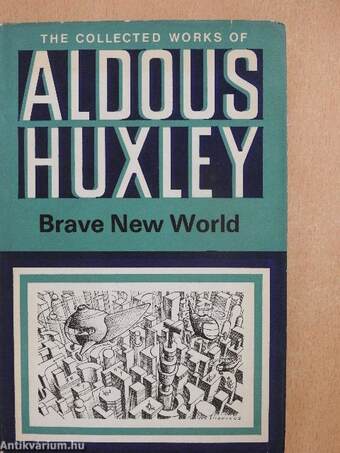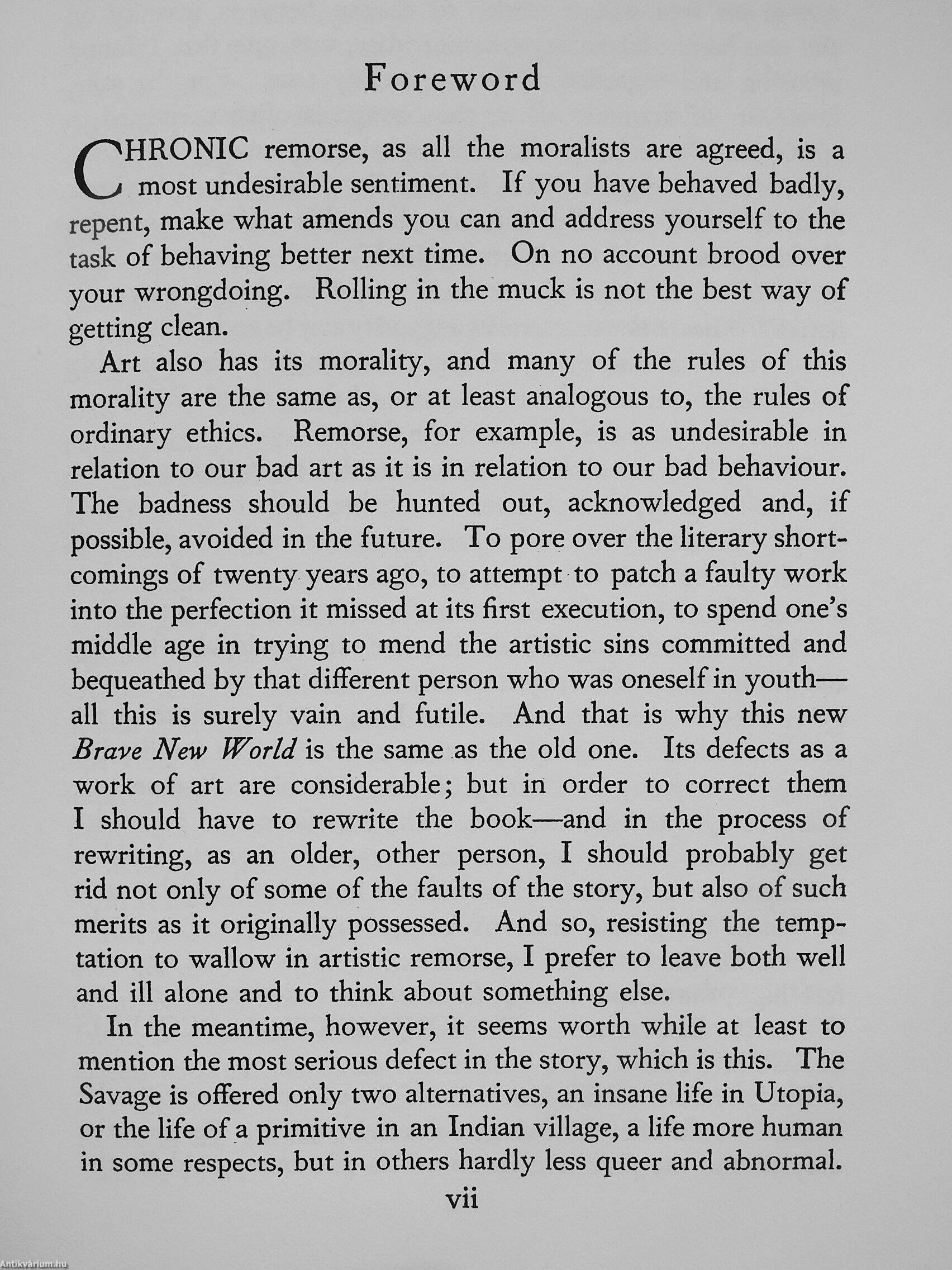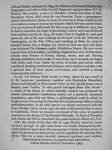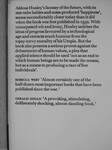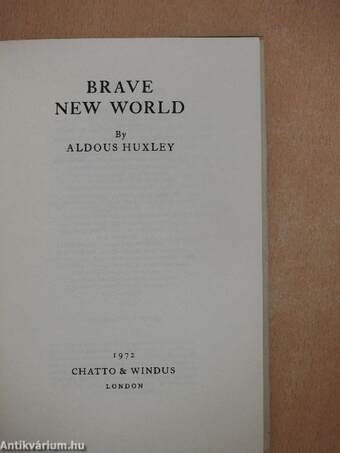1.067.663
kiadvánnyal nyújtjuk Magyarország legnagyobb antikvár könyv-kínálatát

VISSZA
A TETEJÉRE
JAVASLATOKÉszre-
vételek
Brave New World
| Kiadó: | Chatto & Windus |
|---|---|
| Kiadás helye: | London |
| Kiadás éve: | |
| Kötés típusa: | Varrott keménykötés |
| Oldalszám: | 213 oldal |
| Sorozatcím: | The Collected Works of Aldous Huxley |
| Kötetszám: | |
| Nyelv: | Angol |
| Méret: | 20 cm x 14 cm |
| ISBN: | 0-7011-0790-1 |
naponta értesítjük a beérkező friss
kiadványokról
naponta értesítjük a beérkező friss
kiadványokról
Előszó
TovábbFülszöveg
Aldous Huxley was born in 1894, the third son of Leonard Huxley (the biographer and editor of the Cornhill Magazine) and grandson of T. H. Huxley. His mother, a niece of Matthew Arnold and sister of Mrs. Humphry Ward, died when he was fourteen. From a preparatory school (described in Eyeless in Gaza) he went on to Eton, which he left at seventeen owing to serious eye-trouble which left him nearly blind. One eye recovered sufficiently for him to go up to Balliol in 1913, but he had to abandon his hope of becoming a doctor and was debarred from military service in 1914. He took a first in English in 1916 and spent the rest of the war working on the land (with the Morrells at Garsington), at the War Office and teaching at Eton. In 1919 he married Maria Nys, a Belgian (by whom he had one son); the same year he joined The Athenäum under Middleton Murry. He now wrote a great deal of journalism, including biographical and architectural articles and reviews of fiction, drama, music, and... Tovább
Fülszöveg
Aldous Huxley was born in 1894, the third son of Leonard Huxley (the biographer and editor of the Cornhill Magazine) and grandson of T. H. Huxley. His mother, a niece of Matthew Arnold and sister of Mrs. Humphry Ward, died when he was fourteen. From a preparatory school (described in Eyeless in Gaza) he went on to Eton, which he left at seventeen owing to serious eye-trouble which left him nearly blind. One eye recovered sufficiently for him to go up to Balliol in 1913, but he had to abandon his hope of becoming a doctor and was debarred from military service in 1914. He took a first in English in 1916 and spent the rest of the war working on the land (with the Morrells at Garsington), at the War Office and teaching at Eton. In 1919 he married Maria Nys, a Belgian (by whom he had one son); the same year he joined The Athenäum under Middleton Murry. He now wrote a great deal of journalism, including biographical and architectural articles and reviews of fiction, drama, music, and art. Having already published three books of verse from 1916 onwards, he began with Limbo and CromL Tellow the series of stories and novels which combined dazzling intellectual dialogue and a surface cynicism with a ground base of clear moral convictions, and exerted a strong emancipating influence.
In the '20s Huxley lived mostly in Italy, where he saw much of D. H. Lawrence (portrayed, together with Katherine Mansfield, Murry and himself, in Point Counter Point); in the '30s his home was at Sanary, near Toulon. To this period belonged Brave New World— a vision of the future in which scientific control has produced an utterly dehumanized totalitarian society yet a perfectly contented population; also Ends and Means, a philosophical work in which he sought a way of securing the benefits of social planning while avoiding authoritarianism. In the mid '30s he was deeply concerned with the Peace Pledge Union, but in 1937 the state of his eyes led him to move to California. There he became convinced of the value of mystical experience, the theme of The Perennial Philosophy. In Doors of Perception and Heaven and Hell he described the quasi-mystical effects ofL.S.D.
After the death of his first wife in 1955 Huxley married Laura Archera, in 1956. In 1961 their home was totally destroyed by fire. Little survived apart from the manuscript of Island, his last novel, in which he presents an ideal society which repudiates the striving ethos of the West for a more cheerful, balanced quietism, and confines technological advance to eugenics and agriculture.
Aldous Huxley died in November 1963.
Aldous Huxley's fantasy of the future, with its test-tube babies and mass-produced ^happiness', seems uncomfortably closer today than it did when the book was first published in 1932. With unsurpassed wit and irony, Huxley satirises the ideas of progress favoured by a technological age and extracts much humour from the topsy-turvy morality of his Utopia. But the book also presents a serious protest against the debasement of human values, a plea that applied science should be used 'not as an end to which human beings are to be made the means, but as a means to producing a race of free individuals'.
REBECCA WEST ' Almost Certainly one of the half-dozen most important books that have been published since the war.'
GERALD GOULD 'A provoking, stimulating, deliberately shocking, almost dazzling book.' Vissza
Témakörök
- Idegennyelv > Idegennyelvű könyvek > Angol > Szépirodalom > Regény, novella, elbeszélés
- Idegennyelv > Idegennyelvű könyvek > Angol > Szépirodalom > Szórakoztató irodalom > Sci-fi
- Szépirodalom > Regény, novella, elbeszélés > Az író származása szerint > Európa > Nagy-Britannia
- Szépirodalom > Regény, novella, elbeszélés > Tartalom szerint > Utópisztikus regények
- Szépirodalom > Regény, novella, elbeszélés > Tartalom szerint > Szatirikus történetek
- Szépirodalom > Regény, novella, elbeszélés > Tartalom szerint > Filmregények
- Szépirodalom > Szórakoztató irodalom > Sci-fi > Idegennyelvű
- Szépirodalom > Szórakoztató irodalom > Sci-fi > Utópisztikus
Aldous Huxley
Aldous Huxley műveinek az Antikvarium.hu-n kapható vagy előjegyezhető listáját itt tekintheti meg: Aldous Huxley könyvek, művekMegvásárolható példányok
Nincs megvásárolható példány
A könyv összes megrendelhető példánya elfogyott. Ha kívánja, előjegyezheti a könyvet, és amint a könyv egy újabb példánya elérhető lesz, értesítjük.



